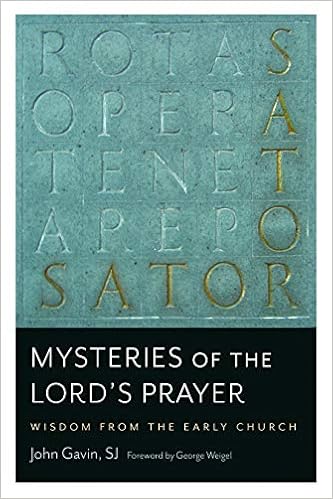Lo those many years ago in Rome, I was in school studying the Fathers of the Church (Patristics) with one of the fine young Jesuits who are rising up in many places.
I just received a new book by this good Jesuit.
Mysteries of the Lord’s Prayer: Wisdom from the Early Church by John Gavin, SJ.

The writer, Fr. Gavin, offers a “new way of reflecting on the Lord’s Prayer” which is actually ancient.
Fr. Gavin digs into ancient, Patristic commentaries on the Our Father, which are amazing. He looks at the different petitions of the Prayer and approaches each one from the point of view on an aporia, or “problems”. For example, recently we heard about how in Italy the liturgical version of the Lord’s Prayer was changed so as to deal with the aporia about the petition “lead us not into temptation”. Does God lead us into temptation? What does that mean?
Another… if God is God, ultimately transcendent, beyond all imagining, how is it that we can call God “Father”?
I’ve just received this and I’ve done some spot reading here and there. This is really an exciting book.
 One reason I like it is because Fr. Gavin is doing something that Pope Benedict XVI said needed to be done in his introduction to his first volume of Jesus of Nazareth. For a long time in Biblical scholarship, “technicians” (my word) have been interpreting scripture. You cannot simply apply tools of modern scholarship, such as the historical-critical method, form criticism, etc., to Scripture without also concerning yourself with the who behind each word. Papa Ratzinger asks us, in his preface, to reconnect with Scripture in a way closer to that the of early Fathers of the Church. Put another way, the Fathers are important now especially because they reconnect us with a way of reading Scripture. They teach us how to read the Bible anew.
One reason I like it is because Fr. Gavin is doing something that Pope Benedict XVI said needed to be done in his introduction to his first volume of Jesus of Nazareth. For a long time in Biblical scholarship, “technicians” (my word) have been interpreting scripture. You cannot simply apply tools of modern scholarship, such as the historical-critical method, form criticism, etc., to Scripture without also concerning yourself with the who behind each word. Papa Ratzinger asks us, in his preface, to reconnect with Scripture in a way closer to that the of early Fathers of the Church. Put another way, the Fathers are important now especially because they reconnect us with a way of reading Scripture. They teach us how to read the Bible anew.
Therefore, Fr. Gavin’s book is a great contribution. He brings in the primary sources of the Fathers to help us gain more from our own praying of Christ’s prayer, which we say so often.
Get a copy for yourself and your parish priest. Then pay attention to see if it affects his preaching!


































Pingback: FRIDAY EDITION – Big Pulpit
I have been wondering for years, in English: “…on earth as it is in heaven.” makes sense because earth should strive to the holiness of heaven. But in Latin, it seems to read backwards: “…sicut in caelo et in terra.”
The Latin seems to say, ‘…in heaven as it is on earth.’ Father, could you shed some light on this?
“…sicut in caelo et in terra.”
One must avoid falling into the trap of reading Latin as if Latin followed English common word order.
Fiat volúntas tua, sicut in cælo et in terra.
Just as it is in heaven, also/so too let it be done on earth.
Just as your will is done in heaven, let it also be done on earth.
Will wait for the e-book. I confess, I hardly ever get hard copies anymore.
Father, if you recommend so enthusiastically this Jesuit, next think you know your readers will be reading Karl Rahner and Pierre Teilhard de Chardin!